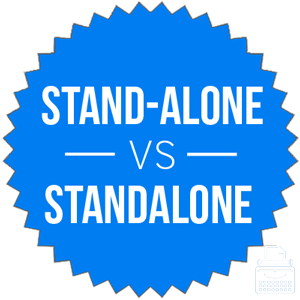If you are the best at what you do, do you stand alone or standalone?
These terms are confusing, since they consist of the same words. Many writers aren’t sure whether to choose the compound version or the single-word version.
In reality, though, each term has an independent usage case, and their meanings never overlap. If you are having trouble with stand alone vs. standalone, continue reading.
What is the Difference Between Standalone and Stand Alone?
In this post, I will compare standalone vs. stand alone and use each spelling in multiple example sentences that demonstrate the proper use in context.
To make choosing standalone or stand alone easier in the future, I will also show you a memory trick that aids in this decision.
When to Use Stand-Alone/Standalone
 When spelled as a closed compound or hyphenated compound, stand-alone/standalone is an adjective. You can think of it as a synonym for independent.
When spelled as a closed compound or hyphenated compound, stand-alone/standalone is an adjective. You can think of it as a synonym for independent.
It often describes a machine or other device that doesn’t rely on other devices to work. It can also appear in other contexts; a stand-alone/standalone software license, for instance, allows for installation on a single computer, usually without the need for renewal or subscription.
For example,
- The stand-alone/standalone power supply is capable of delivering 600 watts of clean power under full load.
- Glen has a stand-alone/standalone license, so if you want to use his copy of the photo editing software, you will have to borrow his computer.
- HBO announced Wednesday that it would start a stand-alone Internet streaming service in the United States in 2015 that would not require a subscription to a traditional television service, a move that intensifies the premium cable network’s growing rivalry with Netflix. –The New York Times
Is stand alone hyphenated? While the closed compound standalone is becoming increasingly common, you are more likely to find it in hyphenated form in dictionaries. For instance, the AP Stylebook prescribes the hyphenated stand-alone as the adjective. Check your local style guide to know how your company or organization prefers it to be spelled.
The constant trend is for compound words in English to start as a multi-word phrase (stand alone) before becoming a hyphenated compound (stand-alone). Eventually, writers drop the hyphen, forming a closed compound (standalone).
This may eventually happen with stand-alone also.
When to Use Stand Alone
 What does stand alone mean? Even still, stand alone is an established idiom in its own right. Stand alone is a verb phrase that means to be in a league of one’s own.
What does stand alone mean? Even still, stand alone is an established idiom in its own right. Stand alone is a verb phrase that means to be in a league of one’s own.
An athlete who figuratively stands alone is unmatched in terms of skills, talent, or sheer physical power.
For example,
- Many closers can pitch reliably in the 9th inning, but since the retirement of future hall-of-famer Mariano Rivera, Kenley Jansen stands alone as the single best closer in the game.
Stand alone could also mean simply to be apart from others, either literally or figuratively.
For example,
- I do not stand alone in my condemnation of Hector Rondon as the worst pitcher on the Cubs team.
- This is why — this is why, as a prime minister of Israel, I can promise you one more thing: Even if Israel has to stand alone, Israel will stand. –The Washington Post
Trick to Remember the Difference
 Let’s go over a trick that can help you pick between these two variations in your future writing.
Let’s go over a trick that can help you pick between these two variations in your future writing.
- Stand-alone and standalone are adjectives.
- Stand alone is a verb phrase.
Since the word stand is itself a verb, you can remember that stand alone is a verb phrase by memorizing the functions of the individual words in the phrase.
Summary
Is it stand alone or standalone? Stand-alone and standalone are adjectives that mean independent. Stand alone is a verb phrase that means to be apart or to be in a league of one’s own.
To summarize,
- Many dictionaries still prefer stand-alone as an adjective.
- Stand alone is a verb phrase.
Contents
